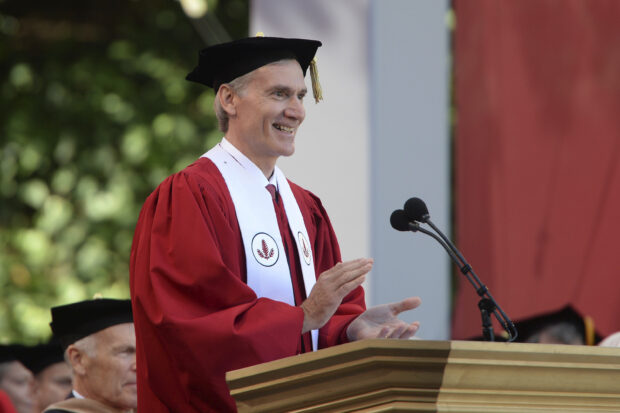Stanford University president announces resignation over concerns about his research

Marc Tessier-Lavigne makes his first address as president as he is inaugurated as the 11th president of Stanford University in Stanford, Calif., on Oct. 21, 2016. Tessier-Lavigne said Wednesday, July 19, 2023, he would resign, citing an independent review that cleared him of research misconduct but found flaws in other papers authored by his lab. He said in a statement to students and staff that he would step down August 31. (Dan Honda/Bay Area News Group via AP)
SAN FRANCISCO — The president of Stanford University said Wednesday he would resign, citing an independent review that cleared him of research misconduct but found “serious flaws” in five scientific papers on subjects such as brain development in which he was the principal author.
Marc Tessier-Lavigne said in a statement to students and staff that he would step down Aug. 31.
The resignation comes after the board of trustees launched a review in December following allegations he engaged in fraud and other unethical conduct related to research and papers that are in some cases two decades old (1999, 2001, 2001)
Tessier-Lavigne, a neuroscientist, says he “never submitted a scientific paper without firmly believing that the data were correct and accurately presented.” But he says he should have been more diligent in seeking corrections regarding his work and he should have operated laboratories with tighter controls.
Panelists found multiple instances of manipulated data in the 12 papers they investigated, but concluded he was not responsible for the misconduct. Still, they found that each of the five papers in which he was principal author “has serious flaws in the presentation of research data” and in at least four of them, there was apparent manipulation of data by others.
Article continues after this advertisementTessier-Lavigne said he was aware of issues with four of the five papers but acknowledged taking “insufficient” steps to deal with the issues. He said he’ll retract three of the papers and correct two.
Article continues after this advertisementThe papers were published before Tessier-Lavigne became Stanford president.
Misconduct allegations about the work were first aired on PubPeer, a website where members of the scientific community can discuss research papers, the report stated. Questions resurfaced after The Stanford Daily, the university’s student-run newspaper, published several stories about the integrity of reports published by his laboratories.
The aggressive reporting merited investigations editor and then-college freshman Theo Baker a special George Polk journalism award. Baker told The Associated Press Wednesday that the retractions and corrections would not have occurred otherwise.
“The fact that we’re able to contribute to the scientific record being corrected for five widely cited papers is important,” he said.
The panel cleared Tessier-Lavigne of the most serious allegations, that a 2009 paper published in the scientific journal Nature was the subject of a fraud investigation and that fraud was found. There was no investigation and no fraud discovered, the panel ruled. The paper proposed a model of neurodegeneration, which could have great potential for Alzheimer’s disease research and therapy, the panel wrote in its report.
But the panel also concluded the paper had multiple problems, including a lack of rigor in its development and that the research that went into the paper and its presentation contained “various errors and shortcomings.” The panel did not find evidence that Tessier-Lavigne was aware of the lack of rigor.
“People tend to think of scientists as these individuals that they’ve heard of like Einstein and Marie Curie,” said H. Holden Thorp, editor-in-chief of the Science family of journals. “The truth is that researchers run laboratories filled with people, and everything that happens in that laboratory is a product of many individuals there.”
While the report cleared Tessier-Lavigne of research misconduct, Thorp said ultimately the boss is responsible for what happens in the lab – and shouldn’t be distracted by doing other jobs. He pointed to the report’s finding that lab culture played a role.
Tessier-Lavigne says he’s stepping down because he expects continued debate about his ability to lead the university. He will remain on faculty as a biology professor. He also said he will continue his research into brain development and neurodegeneration.
The board named Richard Saller, a classics professor, as interim president starting Sept. 1, said board chair Jerry Yang.
In a statement, Yang said Tessier-Lavigne was key to creating the university’s first new school in 70 years, the Stanford Doerr School of Sustainability, and in 2019, he unveiled a strategic long-range plan that will continue to guide the university’s growth.
Tessier-Lavigne has been president for nearly seven years.